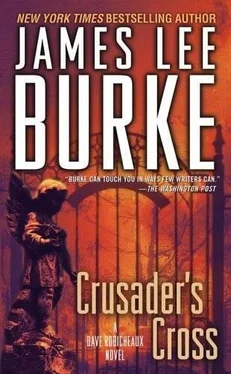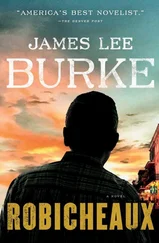I sat for a long time on the side of the bunk bed in the cabin. The flop hat I wore on fishing trips and my raincoat lay on a chair. My skin had no sensation, as though it had been refrigerated or dry-frozen; my hands were stiff and as thick-feeling as cardboard. I didn't have the shakes or sweats, nor were there nightmarish images painted on the backs of my eyelids. Instead, I felt nothing – no hunger, thirst, or erotic need, neither guilt nor remorse, as though I had simply ceased to exist.
My holstered.45 rested on a table, next to a bottle of Scotch, a paper plate containing the remains of a fried-shrimp dinner, a scattered deck of playing cards, and three empty glasses. The.45 was mine; the rest I had no memory of.
I stood up from the bed, then felt my knees cave and the blood drain from my head. I lay back down, my head buried in a pillow that smelled of unwashed hair, my jaws like emery paper.
I slept until early afternoon, and woke trembling and sick, willing to cut off my fingers one at a time with tin snips for the Scotch I had seen earlier.
Except it was gone.
A Creole woman, with one eye that looked like a milky-blue marble pushed deep into the side of her face, sat on a chair by the door, her feet in flip-flops, her wash-faded print dress puffing from a floor fan under her. "Where you going?" she said.
"To the restroom," I replied.
"There ain't no restroom. The privy's in back. Don't go up to the bar, Mr. Dave."
"How do you know me?"
"I belong to your church in Jeanerette. I see you at Mass every Sunday," she replied. Her face was lopsided, perhaps misshaped at birth. Her good eye held on me just a moment, then looked away.
"Why are you here? Why are you watching me?" I said.
"You had bad men in here. Poachers and men carrying knives. What you doin' to yourself, a Christian man, you?"
I used the outbuilding in back. My truck was parked in a clump of gum trees, the paint and body unmarked by an accident. My credit cards and most of my money were still in my wallet. On the lakefront was a bar nailed together from unpainted scrap wood and corrugated tin. I could hear music inside and through a window see men drinking long-necked beers. The wind shifted, and I could smell the fish in the lake, barbecue grease dripping into an outdoor fire, ozone from another storm building out on the Gulf.
Perhaps it was a happy day after all. Maybe nothing truly bad had happened because of my brief fling with the dirty boogie. Maybe all I needed was a couple of beers to straighten out the kinks, medicate the snakes a bit, whisk the spiders back into a dusty corner. What was wrong with that? I was not sure where I was, but the woods were hung with air vines, the oaks and swamp maples and persimmon trees widely spaced, the coulees layered with yellow and black leaves. It was Louisiana before someone decided to insert it in the grinder.
"Oh, there you are," I heard Molly Boyle say behind me. She and the Chalons family handyman, Andre Bergeron, walked down a leafy knoll on the edge of the lake. "We were watching the alligators in the shallows. How about something to eat?" she said.
She drove with me in the truck back toward New Iberia. Her friend, the black man, followed. At Jeanerette, I saw his car turn off the highway. I had hardly spoken since leaving the fish camp deep in the Atchafalaya Basin. Each time we passed a bar I felt as though a life preserver were being pulled from my grasp. "How'd you know where I was?" I asked.
"The lady who was watching you called me. Her husband owns the bar," she replied.
"Why was the Chalonses' handyman with you?" I said.
"Andre helps me in any way he can. He's always been protective of us," she replied. "Don't be angry, Dave."
"I'm not. I just got jammed up," I said irrationally, my hands tightening on the steering wheel, my breath a noxious fog.
Molly was silent. When I looked over at her, she was staring out the side window. "I'll go to a meeting with you," she said.
"I'd better drop you by your house," I said.
"That's not going to happen, trooper. If you try to pick up a drink today, I'm going to break your arm."
I looked at her again, in a more cautious way.
We drove down East Main toward my house, the nineteenth-century homes and manicured lawns and wet trees rushing past me, all of it curiously unchanged, a study in Sunday-afternoon normalcy and permanence to which I had returned like an impaired outsider. I pulled the truck deep into the driveway, past the porte cochere, so that it was almost hidden from the street by the trees and bamboo. I cut the engine and opened the driver's door. When I did, a shiny compact disk fell to the ground. Just next to the edge was a tiny reddish-brown smear that looked like blood.
"What's that?" Molly said.
"I don't know," I said. "I don't know what it is." Vainly, I tried to explain to myself where the CD had come from or who could have placed it in my truck. I touched the crusted smear on the surface and was sure I was touching blood. I slipped the CD in my pants pocket and unlocked the back door, my hands shaking.
Even if Molly had not been with me, my home offered no succor for the drunk teetering on the edge of delirium tremens. I had returned all the booze I'd purchased at Winn-Dixie. There was not even a bottle of vanilla extract in a cabinet. But at least my brother was not home and did not have to see me in the condition I was in.
The only other consolation I had was the fact my bender had not hurt my animals. When I bought my house I had created a small swinging door in the back entrance so Tripod and Snuggs, in case of emergencies, could get to a bag of dry food on the floor. But I couldn't take credit for having thought about them. A drunk on a drunk thinks about nothing except staying drunk.
I got in the shower, turned on the water as hot as I could stand it, and stayed there until the tank was almost empty. Then I dressed in fresh clothes and shaved while my hand trembled on the razor. I could hear Molly clanking pans in the kitchen.
I went into the living room and loaded the CD into my stereo. There was no seal or logo on it, and I suspected it contained nothing more than an Internet download of music someone had not bothered to pay for. But who had left it in my truck? The poachers the Creole woman had mentioned?
I pushed the "play" button on the stereo and the long-dead voice of Harry Choates, singing his signature song, "Jolie Blon," filled the room. That's why I had heard those words over and over in my head when I had woken up that morning, I told myself. Perhaps someone with a cut on his hand had given me Choates's song and I had probably played it repeatedly in my truck's stereo. A blackout didn't necessarily mean I had committed monstrous acts. I had to control my imagination. Yes, that was it. It was all a matter of personal control.
Then a second song began to play, one titled "Two Bottles of Wine," which had been written by Delbert McClinton for Emmylou Harris in the late 1970s. But the singer was not Emmylou. The band was raucous, the recording probably done in a bar or at a party, and the voice on it was the same voice as on the old 45-rpm recording Jimmie believed to have been cut by Ida Durbin.
"Everything in there okay, Dave?" Molly called from the kitchen.
Monday morning the Garden of Gethsemane was the 7:35 traffic backup at the railroad crossing. It also included a horn blowing like a shard of glass in the ear, the hot smell of tar and diesel fumes, undigested food that lay greasy and cold in the stomach, waiting to fountain out of my throat. Then, to demonstrate I was in control of things and not bothered by the metabolic disaster inside my body, I blew my horn at a passing streak of freight cars.
Читать дальше












